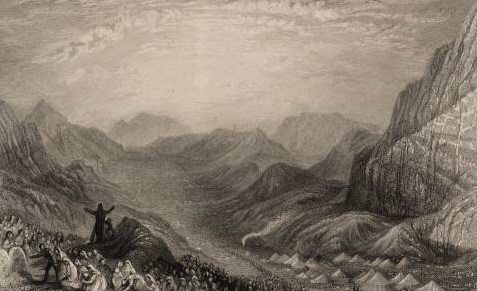Written by Jon Sadik, third-year psychobiology major and vice president of the Jewish Learning Initiative on Campus
When preparing to give the Torah to the Jewish people, G-d gives Moses a curious warning: “Set a boundary for the people roundabout saying, ‘Beware of ascending the mountain or touching its edge; whoever touches the mountain shall certainly die’” (Exodus 19:12). This mandated separation between G-d and the Jewish people seems paradoxical at a time when G-d will reveal Himself to the Jewish people. If G-d will speak to the Jewish people, why does He prohibit them from drawing near to His essence?
This division underscores a constant dichotomy in G-d’s relationship with man — the fact that G-d exists in a realm separate from man, but also lives among His people. The Kedushah prayer in the daily litany establishes G-d’s greatness: “Holy, holy, holy, is the Lord of Hosts,” but then brings Him back to Earth: “The whole world is filled with His glory.” We are commanded to both fear and love G-d. Our fear comes from the knowledge that G-d has powers far beyond our comprehension. This apprehension, however, is the same that a child may experience towards his or her parents. A parent’s actions may scare the child: when taken to the doctor the first time, when brought into a pool to learn to swim, when left at school alone. But ultimately these actions are ones of love — actions designed to help a child and allow him or her to grow. G-d acts very much the same way: while He may ask us to do things that seem difficult, it is the actions that are the hardest that allow us to grow the most.
Furthermore, by prohibiting the Jewish people from drawing close to Him, G-d is sending a clear message to the Jewish people: do not seek holiness in Me, but rather in yourselves. Holiness is not something to be found only in G-d or in the lofty mountains of Sinai — it is something that can be found in each and every one of us. When we visit the sick, or help out a friend in need, we are bringing holiness upon us. As a psychbiology major, I can’t help but to think of something I learned in a social psychology course: that a fundamental way to improve one’s self-image is to help others. Happiness and holiness are not something bestowed upon us, but rather it is something that we build within ourselves. It is my hope that each and every one of us realizes our power to bring greatness into this world.
Shabbat Shalom to all!
____________
This article is part of Ha’Am’s Friday Taste of Torah column. Each week, a different UCLA community member will contribute some words of Jewish wisdom in preparation for Shabbat.

